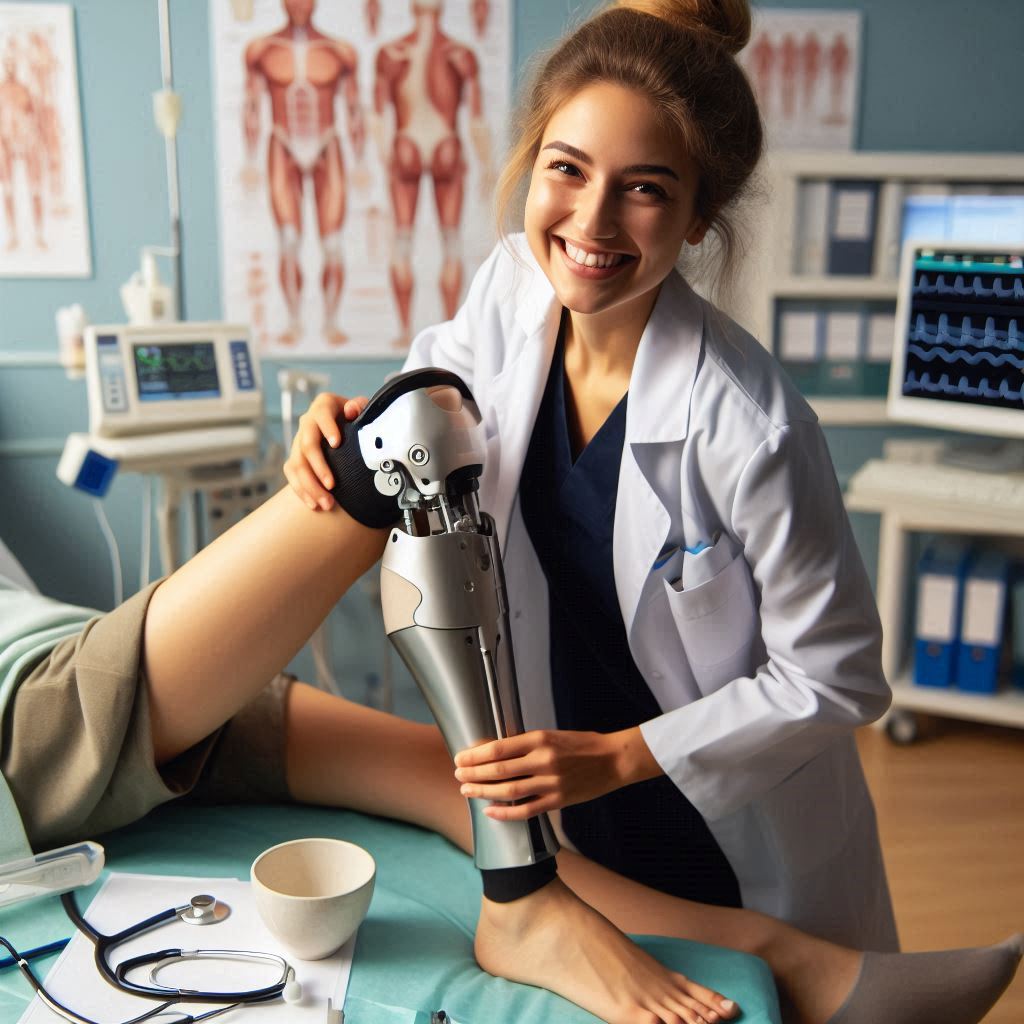Introduction
Sleep technologists occupy a pivotal position in the realm of healthcare, specializing in the diagnosis and treatment of sleep disorders.
Their primary responsibility involves conducting comprehensive sleep studies, where they meticulously monitor and analyze various physiological parameters during patients’ sleep cycles.
They use sophisticated equipment like polysomnography (PSG) and actigraphy devices to capture essential data.
This data includes brain waves, eye movements, muscle activity, heart rhythms, and breathing patterns.
This information forms the basis for diagnosing a spectrum of sleep disorders, ranging from obstructive sleep apnea to insomnia and parasomnias.
Importance of Sleep Technologists
The role of sleep technologists is indispensable in healthcare, particularly in the field of sleep medicine.
Their expertise in interpreting complex sleep data enables them to provide crucial insights into patients’ sleep architecture and identify disturbances that impact sleep quality.
This diagnostic precision is essential for healthcare providers to develop tailored treatment plans that address the specific needs and conditions of each patient effectively.
Beyond diagnostics, sleep technologists also play a vital role in patient education, helping individuals understand their sleep disorders and the importance of adhering to treatment protocols.
This comprehensive approach not only improves clinical outcomes but also enhances the overall health and well-being of patients, fostering better sleep and quality of life.
Lack of standardization in training and certification
Varying requirements for becoming a sleep technologist
Becoming a sleep technologist involves navigating through varying requirements and standards across different regions and institutions.
These requirements typically include completing specific educational programs, such as accredited sleep technology courses or programs that cover polysomnography (PSG) and related topics.
However, the lack of uniformity in these prerequisites often leads to disparities in knowledge and skills among sleep technologists.
In some areas, individuals may pursue certification through professional organizations like the Board of Registered Polysomnographic Technologists (BRPT) or the American Board of Sleep Medicine (ABSM).
These certifications validate competency in conducting sleep studies and interpreting data, but they aren’t universally mandated.
This variability can create challenges, as technologists trained in different environments may have differing levels of expertise and proficiency.
Challenges of inconsistent training leading to gaps in knowledge and skills
The inconsistent training landscape contributes to gaps in knowledge regarding the latest advancements in sleep medicine and technology.
Technologists may encounter difficulties in staying updated with best practices and emerging trends, impacting their ability to provide optimal care for patients.
Moreover, without standardized training requirements, there’s a risk of inadequate preparation for handling complex cases or utilizing advanced equipment effectively.
Addressing these challenges requires efforts to establish more unified standards for training and certification across the field of sleep technology.
Educational institutions, professional organizations, and healthcare providers should collaborate to create comprehensive sleep disorder curricula.
These curricula must cover essential competencies in diagnosing and treating sleep disorders.
Ensuring consistent and rigorous training programs would help standardize the skills and knowledge base of sleep technologists, enhancing their ability to deliver high-quality care.
Technologists must engage in professional development to stay updated in sleep medicine.
This boosts patient outcomes.
Continuing education is essential for keeping current with advancements, leading to improved care.
By advocating for standardized training and certification processes, the sleep technology community can mitigate challenges associated with variability in education and proficiency levels.
This would not only elevate the professionalism and credibility of sleep technologists but also ensure that patients receive standardized, expert care regardless of geographical location or healthcare setting.
Long and irregular work hours
The demanding schedules of sleep technologists
Sleep technologists face demanding schedules that often include overnight shifts to conduct sleep studies.
These professionals play a critical role in monitoring patients’ sleep patterns and collecting essential data on brain activity, breathing, and physiological signals during these nocturnal sessions.
Night shifts are essential because they align with natural sleep patterns, allowing technologists to observe and record accurate sleep data when patients are asleep.
Impact of inconsistent sleep patterns on personal health and well-being
The irregular and often nocturnal work schedules of sleep technologists can significantly impact their personal health and well-being.
Constantly adjusting to night shifts disrupts the body’s natural circadian rhythm, which regulates sleep-wake cycles.
This disruption can lead to chronic sleep deprivation, affecting sleep quality and overall health.
Research indicates that irregular sleep patterns and chronic sleep deprivation contribute to various health issues.
Including increased risks of cardiovascular diseases, metabolic disorders, and compromised immune function.
Moreover, sleep deprivation and shift work have been associated with higher levels of stress, mood disturbances, and cognitive impairment.
Beyond physical health, irregular work hours can also strain personal relationships and social interactions.
Sleep technologists may experience difficulties in maintaining a consistent social life or participating in family activities due to their work schedules.
This can lead to feelings of social isolation and impact overall well-being.
Addressing the challenges posed by long and irregular work hours requires comprehensive strategies.
Healthcare institutions can implement policies that promote sleep hygiene practices and provide resources for managing stress and fatigue.
Offering flexible work schedules and adequate rest periods between shifts can also mitigate the negative effects of night work on sleep quality and health.
Dealing with difficult patients
Working as a sleep technologist comes with its fair share of challenges, one of which is dealing with difficult patients.
Patients who are uncooperative or anxious can make the job more stressful and demanding.
Challenges of working with difficult patients
- Uncooperative behavior can hinder the smooth execution of sleep studies.
- Anxious patients may struggle to relax, affecting the accuracy of results.
- Difficult patients can be disruptive to the overall workflow of the sleep center.
- Communication breakdowns may lead to misunderstandings and delays in the process.
- Handling difficult patients can take a toll on the sleep technologist’s emotional well-being.
Strategies for effectively communicating with patients
Effective communication is key when dealing with difficult patients. Here are some strategies to help manage challenging situations
- Develop strong listening skills to understand the patient’s concerns and fears.
- Use clear and simple language to explain procedures and expectations.
- Show empathy and compassion to build trust and rapport with the patient.
- Stay calm and composed when faced with a challenging situation.
- Provide reassurance and support to help alleviate the patient’s anxiety.
Strategies for managing difficult situations
Dealing with difficult patients requires a mix of patience, empathy, and assertiveness. Here are some strategies to help navigate challenging situations
- Set clear boundaries and expectations with the patient from the beginning.
- Identify triggers that may escalate the patient’s behavior and work to avoid them.
- Collaborate with other team members to find the best approach to managing the patient.
- Offer distractions or relaxation techniques to help calm an anxious patient.
- Seek feedback and guidance from experienced colleagues on handling difficult patients.
By employing these strategies and approaches, sleep technologists can effectively manage difficult patients and ensure a smoother and more productive work environment.
Read: Advancement Opportunities for Surgical Technologists
Keeping Up With Evolving Technology
Rapid Advancements In Sleep Study Equipment And Technology
Sleep technologists face rapid advancements in sleep study equipment and technology.
New devices and software continuously enhance diagnostic accuracy and patient care.
These advancements include innovations in polysomnography (PSG) equipment, wearable sleep trackers, and home sleep apnea testing (HSAT) devices.
The integration of artificial intelligence (AI) and machine learning (ML) in sleep studies also revolutionizes data analysis and interpretation.
Advanced PSG equipment now offers more detailed and precise measurements of sleep parameters.
Enhanced sensors and improved data collection methods allow for better detection of sleep disorders.
Wearable sleep trackers, such as smartwatches and fitness bands, provide real-time monitoring of sleep patterns, enabling early detection of irregularities.
HSAT devices offer patients the convenience of undergoing sleep studies at home, reducing the need for in-lab studies and increasing patient compliance.
Implications of needing to constantly update skills and knowledge to stay current in the field
The rapid pace of technological advancements requires sleep technologists to constantly update their skills and knowledge.
Staying current with these developments is crucial for providing accurate diagnoses and effective treatment plans.
Technologists must continuously learn about new equipment, software updates, and advanced data analysis techniques.
Regular training and professional development are essential for sleep technologists.
Attending workshops, conferences, and online courses helps them stay informed about the latest advancements.
Professional organizations, such as the American Association of Sleep Technologists (AAST), offer valuable resources and certification programs.
These opportunities ensure that technologists remain proficient in using the latest tools and methodologies.
Technologists must also adapt to the integration of AI and ML in sleep studies.
These technologies enhance data analysis by identifying patterns and anomalies that might be missed by human observers.
Learning to work with AI-powered tools and interpreting their outputs is becoming increasingly important.
This shift requires technologists to develop new competencies and embrace a collaborative approach with AI systems.
The need for constant learning can be challenging but also rewarding.
Keeping up with advancements ensures that technologists provide the highest standard of care.
However, it demands significant time and effort, which can be stressful.
Employers can support their staff by providing access to educational resources and allowing time for professional development.
Read: Best Study Resources for Surgical Technologist Students
Balancing administrative tasks with patient care
As a sleep technologist, one of the most challenging aspects of the job is balancing administrative tasks with patient care.
Sleep technologists are responsible for a wide range of administrative duties in addition to providing direct care to patients during sleep studies.
Transform Your Career Today
Unlock a personalized career strategy that drives real results. Get tailored advice and a roadmap designed just for you.
Start NowAdministrative responsibilities
- Paperwork: Sleep technologists are often required to complete detailed paperwork before, during, and after a sleep study. This paperwork includes patient assessments, equipment logs, and reports for the interpreting physician.
- Scheduling: Coordinating appointments for sleep studies can be a time-consuming task. Sleep technologists must ensure that patients are scheduled at convenient times while also managing the availability of sleep study rooms and equipment.
- Patient interactions: Sleep technologists must communicate effectively with patients, explaining procedures, answering questions, and addressing concerns. Building rapport with patients is essential for ensuring a successful sleep study.
Challenges of managing paperwork, scheduling, and patient interactions simultaneously
Managing paperwork, scheduling, and patient interactions simultaneously can be overwhelming for sleep technologists.
It requires strong organizational skills, attention to detail, and the ability to prioritize tasks effectively.
- Time management: Juggling administrative tasks with patient care requires excellent time management skills. Sleep technologists must find ways to allocate their time efficiently, balancing the needs of multiple patients and responsibilities.
- Communication skills: Interacting with patients while managing paperwork and scheduling requires strong communication skills. Sleep technologists must be able to explain procedures clearly, listen attentively to patients’ concerns, and convey necessary information effectively.
- Stress management: The demands of balancing administrative tasks with patient care can be stressful. Sleep technologists must find healthy ways to cope with stress, such as practicing self-care techniques, seeking support from colleagues, and maintaining a positive attitude.
Basically, sleep technologists face significant challenges in balancing administrative tasks with patient care.
Sleep technologists navigate challenges by honing organizational skills and mastering communication strategies.
They manage stress effectively to provide high-quality patient care.
Read: Continuing Education for Surgical Technologists: Why It Matters

Limited career advancement opportunities
One of the common challenges faced by sleep technologists is limited career advancement opportunities.
In this section, we will explore the potential for career growth in the field of sleep technology and discuss strategies for pursuing further education or certifications to enhance career prospects.
Potential for Career Growth
- With the increasing awareness of sleep disorders, the demand for qualified sleep technologists is on the rise.
- As technology continues to advance, new opportunities are emerging in the field of sleep medicine.
- Experienced sleep technologists have the potential to move into supervisory or management roles within sleep centers.
- There is also the possibility of transitioning into roles such as clinical research coordinators or educators in the field.
Strategies for Career Advancement
- Continuing education is key to advancing in the field of sleep technology. Pursuing higher education, such as a bachelor’s or master’s degree, can open up new opportunities.
- Obtaining additional certifications, such as the Registered Sleep Technologist (RST) credential, can demonstrate proficiency and dedication to the field.
- Networking with other sleep professionals can provide valuable insights and new career opportunities.
- Attending conferences and workshops is a great way to stay updated on the latest advancements in sleep medicine and connect with potential employers.
- Volunteering for special projects or taking on leadership roles within your organization can help showcase your skills and commitment to professional growth.
- Seeking mentorship from seasoned sleep technologists or other healthcare professionals can provide guidance and support in your career advancement journey.
By pursuing further education, obtaining certifications, and networking with professionals, sleep technologists can unlock new career growth opportunities.
These proactive steps help overcome limited advancement challenges, fostering success in their careers.
Read: Interview Tips for Landing a Surgical Technologist Job
Delve into the Subject: Top Online Medical Coding Courses and Programs
Coping with burnout and compassion fatigue
Recognizing the Emotional Toll
Working as a sleep technologist can be emotionally challenging, especially when dealing with patients who are suffering from serious sleep disorders.
It can be distressing to witness the impact these disorders have on patients’ lives, as well as the frustration they may feel as they struggle to get a good night’s sleep.
Additionally, the nature of the job requires sleep technologists to work closely with patients, forming relationships with them as they conduct sleep studies and monitor their progress.
This can make it harder to detach emotionally from the patients’ struggles and experiences.
Importance of Self-Care
Self-care is crucial for sleep technologists to prevent burnout and compassion fatigue.
It’s essential to prioritize your own mental and emotional well-being in order to continue providing quality care to patients.
Set boundaries with patients to prevent emotional exhaustion.
Seek support from colleagues or supervisors when needed. Engage in relaxing activities outside of work to recharge.
Seeking Support
Don’t hesitate to reach out for help if you’re feeling overwhelmed or emotionally drained.
Talking to a counselor or therapist can provide valuable support and guidance as you navigate the challenges of working with patients with sleep disorders.
Connecting with other sleep technologists through professional organizations or support groups can also be beneficial.
Sharing experiences and strategies with others who understand the unique demands of the job can help you feel less isolated and more supported.
Sleep technologists can cope with burnout by recognizing the emotional toll of working with serious sleep disorder patients.
Prioritizing self-care helps maintain well-being.
Seeking support when needed effectively combats compassion fatigue.
Taking care of your own well-being is essential in order to continue providing high-quality care to patients.
Conclusion
Sleep technologists encounter a variety of challenges in their daily practice that impact both patient care and job satisfaction.
Patient discomfort during sleep studies can hinder data collection, while technical equipment malfunctions may disrupt the diagnostic process.
Interpreting complex data from polysomnography (PSG) and other sleep tests requires keen attention to detail and specialized knowledge, adding another layer of complexity to their responsibilities.
Addressing these challenges is essential for ensuring high-quality care for patients.
Technologists must navigate these obstacles to accurately diagnose sleep disorders, tailor treatment plans, and monitor therapy effectiveness.
Moreover, overcoming these challenges contributes to job satisfaction among technologists, fostering a positive work environment where they can thrive professionally.
Sleep technologists can enhance their practice’s efficiency by implementing regular equipment maintenance.
Educating patients on study procedures improves outcomes.
Ongoing professional development further boosts effectiveness.
This proactive approach improves diagnostic accuracy and treatment outcomes for patients.
It supports technologists in delivering compassionate care.
Technologists achieve job fulfillment in their vital healthcare team role.
[E-Books for Sale]
The Big Book of 500 High-Paying Jobs in America: Unlock Your Earning Potential
$19.99 • 500 High-Paying Jobs • 330 pages
Explore 500 high-paying jobs in America and learn how to boost your career, earn more, and achieve success!
See All 500 High-Paying Jobs of this E-Book
1001 Professions Without a Degree: High-Paying American Jobs You Can Start Now
$19.99 • 1001 Professions Without a Degree • 174 pages
Discover 1001 high-paying jobs without a degree! Unlock career tips, skills, and success strategies for just $19.99!




